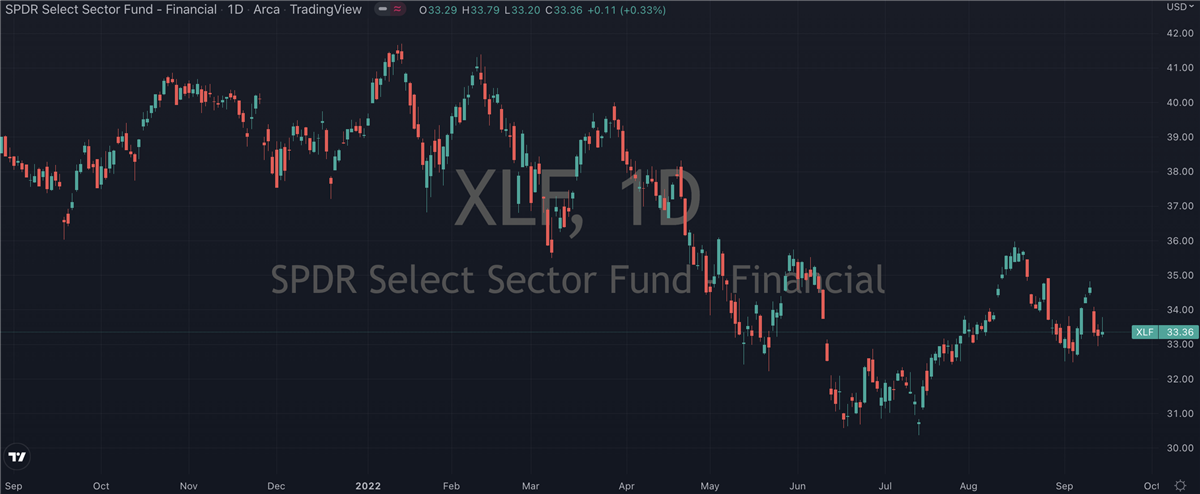3 Banks Worth Considering For Q4 Could bank stocks be about to turn around and head north for the last quarter of the year? Let's take a look at three of them that are worth considering.
By Sam Quirke
This story originally appeared on MarketBeat

- Rates will continue to climb with inflation concerns
- Finding opportunities is becoming more difficult
- Could bank stocks be about to turn around and head north?
With the Fed continuing to take us into a rising interest rate cycle, you'd be forgiven for thinking that banks would be one of the better-performing sectors this year, but that's not the case. One of the bigger financial ETFs, SPDR Financial (NYSEARCA: XLF), is down about 20% right now from its January levels. And that's including a recent rally that's taken it up from the 52-week lows it hit in July.
It seems that red hot inflation and the subsequent worsening consumer sentiment are proving too much of a headwind for what should otherwise be a fundamental reason to get long banks. But that's not to say there isn't an opportunity to be had though, especially with the broader sector ETF having put in a low two months ago. Could bank stocks be about to turn around and head north for the last quarter of the year? Let's take a look at three of them that are worth considering.
Bank of America (NYSE: BAC)
First up is Bank of America. Their shares are up 15% since July and showing some sideways action right now around the mid $30s level. This kind of consolidation was sorely needed after the multi-month slide that saw them drop from the $50 mark they were trading at in February. Though their most recent earnings report missed analyst expectations, management still felt confident enough to boost their dividend by 5%.
This is considered one of the strongest signals that a company can give to the market, and investors thinking about picking up some exposure to the financial sector would do well to take notice. This is because the reverse action, reducing or canceling a dividend, can be so catastrophic. So by virtue of the fact that they're confident enough in the company's ability to maintain this new payout into the foreseeable future, we can deduce that they're gaining confidence about the company's ability to keep growing.
Considering shares are still trading down 30% from all time highs they hit earlier this year, it's fair to think they might well be trading at a discount here.
JPMorgan (NYSE: JPM)
Next up is JPMorgan, which trades with a market cap that's about 25% larger than Bank of America's. Like their peers, JPMorgan has seen its shares trade mostly sideways in recent weeks as the selling has run out of steam. Technically, there's a lot to like about them right now.
Looking at their chart, we can see the stock has managed to put in a series of higher highs and higher lows since July, a technical set up that is almost always indicative of a rally being formed. The stock's relative strength index (RSI) is also rising as is the MACD. This latter indicator has actually just had a bullish crossover and is moving further into positive territory.
All these confirm the move by Peter Richardson at Berenberg who earlier this summer upgraded his rating on JPMorgan from Sell to Hold. He viewed headwinds such as reduced banking activity, paused stock buybacks and rising expenses as all fairly temporary, and made the point that much of the downside risk to the bank was already priced into shares. Further confirmation that these headwinds are dissipating would do much to push shares up and out of the recent consolidation pattern.
Goldman Sachs (NYSE: GS)
Last but definitely not least, Goldman Sachs, which is by far the best performing of the three stocks in this article. While Bank of America and JPMorgan shares are down 22% and 25% respectively since the start of the year, Goldman shares are down just 15%. They've also rallied the most in recent weeks, and were at one point up a full 30% from the lows of July.
Fundamentally, Goldman has earned a strong reputation on Wall Street for having one of the better-diversified banking businesses. They have multiple revenue-generating verticals like investment banking, global markets, asset management and wealth management all combining to deliver more than $11 billion of revenue on a quarterly basis, which beat the consensus at the last count.
This diversification means they're not as exposed to cyclical fluctuations and is one of the core reasons their shares have outperformed most of the sector this year. For those looking to get involved in some banks, but are hesitant to buy any stocks that's down more than 20% this year, Goldman is a solid option to consider.









